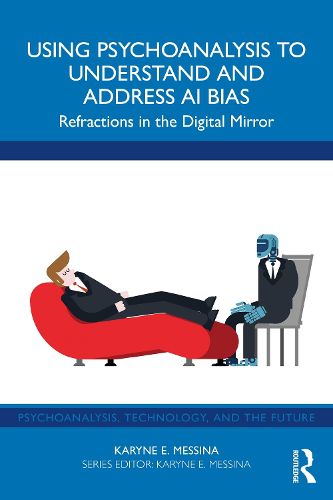Readings Newsletter
Become a Readings Member to make your shopping experience even easier.
Sign in or sign up for free!
You’re not far away from qualifying for FREE standard shipping within Australia
You’ve qualified for FREE standard shipping within Australia
The cart is loading…






In Using Psychoanalysis to Understand and Address AI Bias: Refractions in the Digital Mirror, Karyne E. Messina uses a psychoanalytic lens to explore the subconscious forces driving AI development.
This book provides a unique psychoanalytic framework for understanding how AI systems internalize and amplify the unconscious biases of their human creators. Through detailed case studies in clinical healthcare, predictive policing, and automated hiring, Messina introduces concepts such as projection, splitting, and projective identification. She illustrates how these psychological mechanisms - originally developed to explain human behavior - are inadvertently built into the logic of AI, creating systems that replicate societal inequities on a massive scale.
Using Psychoanalysis to Understand and Address AI Bias will be of interest to all readers interested in how AI can benefit from psychoanalytic insight, including psychoanalysts in practice and in training and academics and scholars of AI ethics and technology policy.
$9.00 standard shipping within Australia
FREE standard shipping within Australia for orders over $100.00
Express & International shipping calculated at checkout
Stock availability can be subject to change without notice. We recommend calling the shop or contacting our online team to check availability of low stock items. Please see our Shopping Online page for more details.
In Using Psychoanalysis to Understand and Address AI Bias: Refractions in the Digital Mirror, Karyne E. Messina uses a psychoanalytic lens to explore the subconscious forces driving AI development.
This book provides a unique psychoanalytic framework for understanding how AI systems internalize and amplify the unconscious biases of their human creators. Through detailed case studies in clinical healthcare, predictive policing, and automated hiring, Messina introduces concepts such as projection, splitting, and projective identification. She illustrates how these psychological mechanisms - originally developed to explain human behavior - are inadvertently built into the logic of AI, creating systems that replicate societal inequities on a massive scale.
Using Psychoanalysis to Understand and Address AI Bias will be of interest to all readers interested in how AI can benefit from psychoanalytic insight, including psychoanalysts in practice and in training and academics and scholars of AI ethics and technology policy.